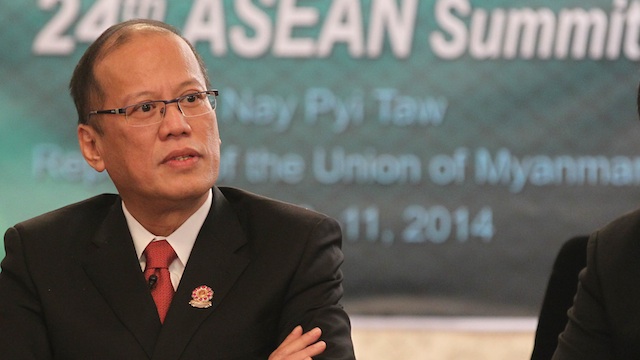SUMMARY
This is AI generated summarization, which may have errors. For context, always refer to the full article.

MANILA, Philippines (UPDATED) – While tensions between the Philippines and China rise over a territorial dispute at the West Philippine Sea (South China Sea), China’s ambassador to the Philippines Zhao Jianhua gave assurances to President Benigno Aquino III that the row between the two countries is only temporary.
On Tuesday, June 10, at the the Filipino-Chinese community’s joint celebration of the 116th Philippine Independence Day and 13th Filipino-Chinese Friendship Day, Zhao said China also values peace and stability in the region, especially because it contributes to the region’s economic growth and increasing momentum.
“Compared with our thousand-year-old friendship and extensive cooperation, the difficulties we’re facing on South China Sea are temporary,” Zhao said before other officials of the Philippine government, diplomatic corps members, the business sector, and representatives of Filipino-Chinese organizations.
“It is our common responsibility to handle the South China Sea issue in a proper and peaceful manner. It is our common responsibility to carry on and further promote bilateral friendship and cooperation inherited from our ancestors to the future generations. This serves the fundamental interests of our two countries, the well-being of our two peoples as well as peace and stability of the region,” he said.
Zhao also highlighted the need for “peace and stability” in the region to maintain the region’s economic growth, and said he believed in the two countries’ ability to settle the dispute.
“The Chinese government has always attached great importance to its relations with the Phiippines, and I believe that we have the wisdom, patience and courge to settle the disputes through negotiations and consultations,” he said, although he did not make any mention of the international tribunal the Philippines has sought help from to settle the row.
Zhao then expressed confidence about the future of China-Philippines relations.
Evidently surprised and caught off guard, Aquino’s speech did not contain anything related to the dispute and instead focused on the contributions of the Filipino-Chinese community to the economy. But at the end of it, Aquino thanked Zhao on the spot for his “kind words.”
Aquino praised Zhao for his “very poignant and well-thought of words.” He recounted his state visit to China in 2011, and said he was encouraged by President Hu Jintao, when he was told by the leader that “the disputes that we do have in the sea that borders our respective lands should not be the sum total of our relationships.”
“Our relationships are based on so many more things, not just on this dispute, and that peace and stability are necessary components for our own, for everybody’s progress,” Aquino said.
The President also said the assurance of Zhao gives him comfort.
“Now, we did state we are both committed the lot and the circumstances of our peoples, and to hear them reiterated today truly fills our heart.”
China and the Philippines are caught in a maritime dispute over territories in the South China Sea. China’s claim to nearly all of the area, which straddles vital sea lanes and is believed to sit on vast oil and gas reserves, has strained its ties with Southeast Asian countries.
On March 29, 2014, the Philippines submitted a nearly 4,000-page document, called a memorial, in a bid to end what it considered decades of bullying by China. The superpower has refused to acknowledge the designated arbitral tribunal’s jurisdiction to hear the case. (READ: China rejects PH case, invokes int’l law)
Focus on ASEAN
The Philippines confirmed on Monday, June 9, that Indonesia has proposed a special meeting among foreign ministers of the Association of Southeast Asian Nations (ASEAN) to discuss rising tensions in the disputed South China Sea.
Most recently, Filipino and Vietnamese troops played volleyball and football in a contested South China Sea archipelago – a landmark act of sports diplomacy that both sides said could ease territorial tensions. Vietnam is also a claimant of disputed territories against China. Beijing has slammed the ties between the Philippines and Vietnam.
But Zhao in his speech emphasized the need to continue working with ASEAN, as well as the Philippines, whose “rapid and impressive economic growth” has contributed to the region’s development.
“China and ASEAN have become more important trade and investment partners… China has been the largest trading partner of the ASEAN for 4 consecutive years,” he said.
Zhao cited that in 2013, the two-way trade between China and ASEAN reached $443.6 billion, or a 10.9% increased on a yearly basis. He also said China is the largest trading partner of half of ASEAN countries like Malaysia, Indonesia, Singapore, Myanmar and Vietnam – and both sides have agreed to strive for the bilateal trade target of $1 trillion, and two-way investment of $150 billion by 2020.
In the next 5 years, Zhao said China also plans to import $10 trillion worth of products and China’s outbound foreign direct investment will exceed $500 billion. All these, he said, will benefit the region.
“Peace and stability are precious prerequisites for economic and social development. Most Asian countries are developing countries. It is our commona aspiration to maintain regional peace and stability and to keep the momentum of development in Asia,” he said. – Rappler.com
Add a comment
How does this make you feel?
There are no comments yet. Add your comment to start the conversation.